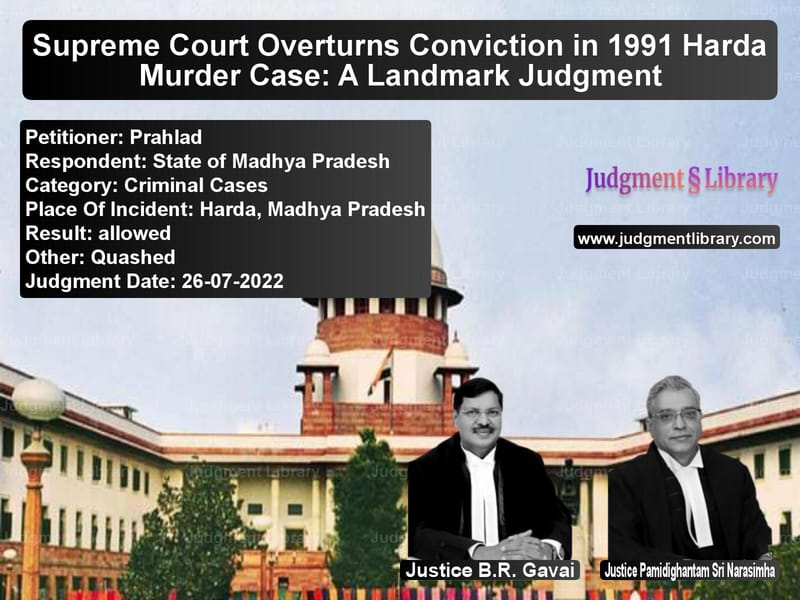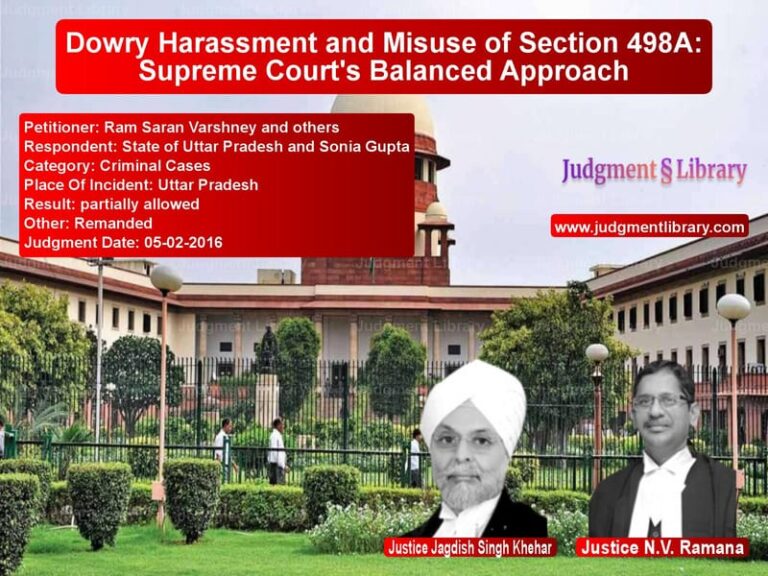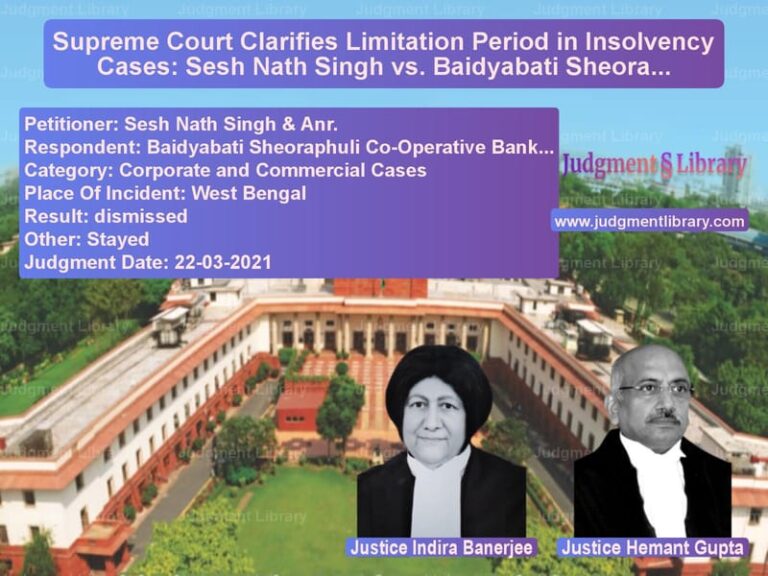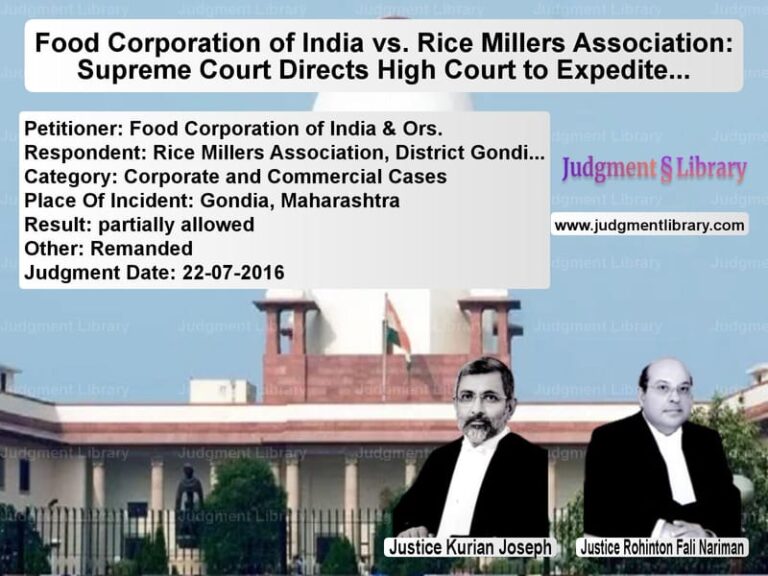Supreme Court Overturns Conviction in 1991 Harda Murder Case: A Landmark Judgment
The case of Prahlad vs. State of Madhya Pradesh is a crucial example of how courts deal with appeals against acquittals and the significance of due process in criminal jurisprudence. The case stemmed from a murder that took place in 1991, leading to multiple legal proceedings, including an acquittal by the trial court, reversal by the High Court, and eventual restoration of the acquittal by the Supreme Court.
The Supreme Court, comprising B.R. Gavai and Pamidighantam Sri Narasimha, reviewed the judgment of the Madhya Pradesh High Court, which had convicted the accused under Section 302 read with Section 34 of the IPC. After detailed scrutiny, the Court found serious inconsistencies in the prosecution’s case and overturned the conviction, reinstating the original acquittal.
Background of the Case
The case began with the murder of Ramesh, a resident of Chhoti Harda, Madhya Pradesh, on June 22, 1991. According to the police report, Ramesh was attacked near Handia Bus Stand by assailants who fired at him at close range. The prosecution claimed that this was a premeditated murder driven by political rivalry.
The key allegations by the prosecution were:
- Accused Mohan and Prahlad had a political feud with the deceased, leading to the crime.
- The accused arrived at the crime scene on a motorcycle and shot Ramesh from close range.
- Eyewitness testimony from Mahesh supported the prosecution’s claims.
- The forensic report confirmed that the recovered firearm was used in the attack.
- The accused fled the scene, and the motorcycle was later recovered.
Following the investigation, the case went to trial in Sessions Court, which found multiple inconsistencies in the prosecution’s case and acquitted the accused.
Appeal to the High Court
The State of Madhya Pradesh challenged the acquittal in the High Court. After reviewing the case, the High Court reversed the acquittal and convicted Mohan and Prahlad under Section 302 read with Section 34 IPC, sentencing them to life imprisonment.
Defense’s Arguments Against Conviction
- The prosecution’s case had major inconsistencies and contradictions.
- Key evidence was either missing or had been manipulated.
- Witness statements changed at different stages of the case.
- The forensic evidence relied upon by the High Court was not conclusive.
- The Sessions Court had already noted these discrepancies while acquitting the accused.
The defense, led by Mr. Vivek K. Tankha, argued that the High Court failed to provide valid reasons for overturning a well-reasoned acquittal.
Supreme Court’s Observations and Ruling
The Supreme Court found multiple lapses in the prosecution’s case and errors in the High Court’s reasoning. The key findings were:
- The High Court had relied on the testimony of a single witness (Mahesh), which was inconsistent.
- The prosecution had presented three different versions of the case, weakening its credibility.
- Key police records and investigation documents were missing.
- The recovery of the firearm was from an open and accessible area, making it unreliable.
- The investigation had been conducted in a manner that raised serious doubts.
The Court ruled:
“The High Court has totally erred in reversing the well-reasoned order passed by the learned Sessions Judge acquitting the accused. The High Court has traveled much beyond the scope of interference in an appeal against acquittal.”
The Court reiterated that interference in acquittal should only be in cases where the trial court’s decision is perverse or impossible. In this case, the Sessions Court had correctly assessed the evidence and found that the prosecution failed to prove its case beyond reasonable doubt.
Legal Precedents Considered
The Supreme Court cited several judgments supporting the principle that appellate courts should be cautious while reversing acquittals:
- Guru Dutt Pathak vs. State of Uttar Pradesh: Reinforced that appellate courts should not interfere in acquittals unless the trial court’s view is unreasonable.
- Anil Phukan vs. State of Assam: Established that while a conviction can be based on a single eyewitness, the testimony must be beyond doubt.
- Sunil Kundu vs. State of Jharkhand: Held that lapses in investigation cannot be ignored if they affect the core prosecution case.
Final Verdict
The Supreme Court quashed the conviction and restored the acquittal of Mohan and Prahlad. The Court also directed that their bail bonds be discharged.
This case serves as a crucial reminder of the importance of fair trials, reliable evidence, and the role of appellate courts in ensuring justice.
Petitioner Name: Prahlad.Respondent Name: State of Madhya Pradesh.Judgment By: Justice B.R. Gavai, Justice Pamidighantam Sri Narasimha.Place Of Incident: Harda, Madhya Pradesh.Judgment Date: 26-07-2022.
Don’t miss out on the full details! Download the complete judgment in PDF format below and gain valuable insights instantly!
Download Judgment: prahlad-vs-state-of-madhya-prad-supreme-court-of-india-judgment-dated-26-07-2022.pdf
Directly Download Judgment: Directly download this Judgment
See all petitions in Murder Cases
See all petitions in Judgment by B R Gavai
See all petitions in Judgment by P.S. Narasimha
See all petitions in allowed
See all petitions in Quashed
See all petitions in supreme court of India judgments July 2022
See all petitions in 2022 judgments
See all posts in Criminal Cases Category
See all allowed petitions in Criminal Cases Category
See all Dismissed petitions in Criminal Cases Category
See all partially allowed petitions in Criminal Cases Category







